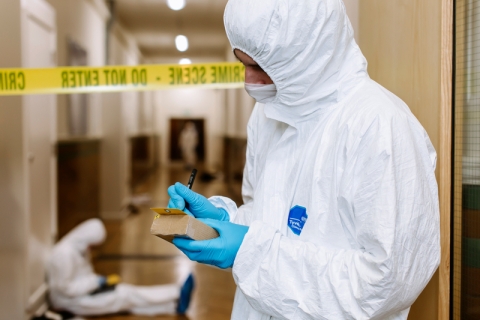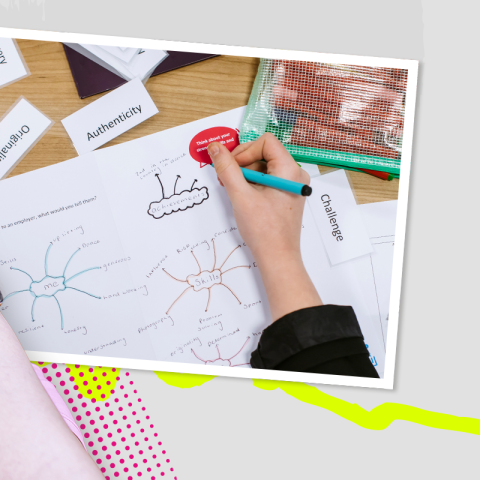

Criminology
Understanding the 'what, why & how' of crime
Where there's civilisation, there's crime. It's a global concern, both on a local and international scale. If you're interested in understanding our society, why people may commit crimes and using this knowledge to help prevent crime, criminology may be the degree for you.
What is criminology?
There are different areas of Criminology you can study. Criminology itself is the study of crime and criminals. While Criminal Justice relates to the agencies involved in the justice and penal systems, such as police, prisons, probation – and their responses to crime. Forensic Studies looks at types of evidence and how to analyse it for use in criminal investigations.
What unites the field is looking at the underlying reasons behind criminal behaviour. What social and psychological factors motivate actions? And what are the effects of crime on people and communities? Up to the challenge of solving these puzzles? Then you can help tackle one of society's biggest challenges.
Where could it lead?
Depending on the course you choose, you'll also gain the sociological, psychological and forensic skills required to go into fields of law enforcement, probation, crime rehabilitation, cybercrime, counter fraud and crime prevention.
What's it like to study Criminology and how does it apply to a career?
University of Portsmouth Criminology graduate Matt Hockley
Matt graduated in 2018 with a Criminology and Criminal Justice degree from the University of Portsmouth. He is now a Probation Practice Research Assistant. Find out what Matt’s role entails and how he’s applying the skills he learned during his time at Portsmouth
Matt: My name is Matt. I'm currently working as a probation practice research assistant.
I wanted to study criminology at the University of Portsmouth because of its reputation. I just found that the staff were supportive. I loved my cohort, they were absolutely fantastic and I love the approach that they took whilst I was there. So supportive, so willing to let me adapt and evolve as a criminologist. I started off as very shy and not a lot of confidence, and I feel like I definitely flourished during my time there.
My four week placement at the Portsmouth City Council was about crime and anti-social behaviour research, and I feel that experience really gave me that edge when I went for my first job outside of university.
I found there was an internship at the Royal Courts of Justice, despite there being quite a few applications, I was very lucky to get the role. I chose to apply for the Royal Courts of Justice here because it was in my chosen field, I've done work beforehand in probation and in prison. It just gave you a really good insight into how the court system is run.
My first week of properly working in the Royal Courts of Justice, I remember there were people cheering and people shouting and I was a bit confused. I thought, this is a very grand gesture for someone's first week, but I looked behind me and Johnny Depp is coming in for his court case, which was certainly a very interesting experience for someone's first week of work!
I love criminology. I would say my motivation is definitely to help people. My particular interest is about looking at gender and sexuality and how that is understood and how that is dealt with by the criminal justice system. I feel like the stuff that I am producing and the stuff that I'm researching has got wide implications and will benefit people. Without the University of Portsmouth, I would definitely not be the person I am today.
What jobs can you do?
Opportunities exist in both the private and public sector if you study Criminology.
You could work in central and local government, for the police, in prison and probation services or court services.
It's also possible to work in a range of social welfare posts, such as mental health support, non-profit organisations including the NHS and even in the private sector, for example in security and law.
What skills will you gain?
You'll also gain transferrable skills, which will be highly valued by both technical and non-technical employers such as:
- Problem solving – taking an analytical approach to solving crimes
- Communication – working with people to share ideas and using technical language correctly
- Hands-on skills – planning, doing and reporting experiments
- Reasoning – making logical arguments and discussing complex problems
My teachers were former forensics and detectives and it was fascinating to hear them relate everything we learnt to a real case they'd worked on in the past.
Isobel Linsel, Alumna, BSc (Hons) Criminology and Forensic Studies
An intro to forensic investigation
A key step in many criminal investigations is Forensic Investigation to gather any evidence of the crime, for use in the criminal trial. One of the things our students do to learn about this, is to work on a mock-up of a real crime scene.

Practice scenario: a hotel assault
You are the Crime Scene Manager and Lead Investigator on an assault that has taken place in one of the rooms at a hotel. You’re responsible for leading the investigation and your task is to identify the steps that need to be taken for the investigation, including the examination of the evidence at the scene.




